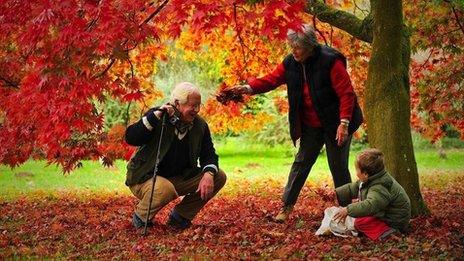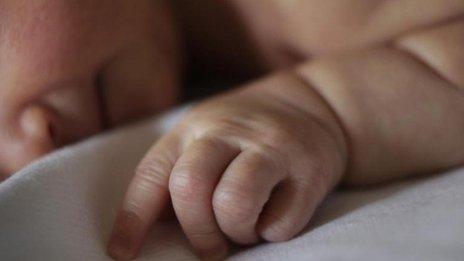Grandparents must get unpaid leave, says TUC
- Published

Many grandparents are involved in childcare, allowing parents to work
Grandparents should be given the right to request unpaid leave as they are so involved with childcare, the TUC says.
It has called for an extension of their right to ask for time off to look after grandchildren, which currently only applies in emergencies.
The TUC estimates that seven million grandparents provide regular childcare for youngsters aged under 16.
The government said it was extending the right to request flexible working to all employees from April 2014.
A separate report suggests many of these grandparents will be better off than the next generation.
People born in the 1960s and 1970s will rely on inheritance in order to be better off in retirement than their predecessors, according to the Institute for Fiscal Studies (IFS).
Childcare fees
The most common reason for grandparents to take on childcare duties, according to the TUC, is to allow the child's parents to go to work.
It said that its survey suggested that working grandparents were more likely to help look after grandchildren than retired grandparents.
Consequently it wants to see a clearer right to ask for unpaid leave, such as one day a fortnight, rather than just being able to ask an employer for the occasional emergency day off.

The cost of childcare creates financial pressure for some families
"The informal childcare that millions of grandparents regularly provide is one of the most important and unheralded forms of care in Britain today," said TUC general secretary Frances O'Grady.
"The childcare provided by grandparents allows mums and dads to work, saves them money on nursery and childminder fees, and creates a special bond across different generations in a family.
"Many businesses have yet to keep up with this trend and thousands of grandparents who want to look after their grandkids are prevented from doing so. It's important that public policy catches up with the needs of working grandparents and their families."
A spokeswoman for the Department for Business said: "Making flexible working available to all will not just benefit grandparents but allow the wider family to help out with child caring responsibilities. It will give all employees the opportunity to better balance work with their personal life."
Wealth pattern
The TUC's call comes on the same day as the IFS report suggests that many of today's parents are relying on inheritance to continue the trend of being better off than their predecessors.
It said that, when compared with those born a decade earlier, pay was no higher and their savings no greater for those born in the 1960s and 1970s, when inflation was taken into account.
They were also less likely to own a home, would have lower pension wealth and were likely to see a proportionately lower state pension compared to earnings.
"Since World War Two, successive cohorts have enjoyed higher incomes and living standards than their parents. Yet the incomes and wealth of those born in the 1960s and 1970s look no higher than [those] who came before them," said Andrew Hood, who wrote the report.
As a result, he said, those born in the 1960s and 1970s would see this topped up by inheritance, but this was unequally distributed and tended to benefit those who were already wealthy.
- Published1 February 2013
- Published5 December 2013
- Published7 December 2010